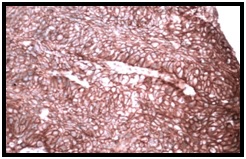Prognostic and theranostic role of epidermal growth factor receptor expression in colorectal cancers
Abstract
Background: The outcome of Colorectal carcinoma (CRC) is highly influenced at diagnosis, presence of prognostic factors and the treatment modality. Evaluation of prognostic factors is predominantly done by pathological assessment of CRC resection specimens. This study was done to correlate the expression of EGFR in the colorectal carcinoma cases by immunohistochemistry which will facilitate the targeted therapy for patients suffering from this malignancy.
Methods: This retrospective study was done on H and E sections retrieved from the surgical pathology registers on 100 cases of CRC. The methodology we used here were specimen reception, collection of clinical data, tissue processing & making paraffin blocks, hematoxylin & Eosin staining, histological assessment, interpretation of data, selection of appropriate block for immuno histochemistry (IHC), IHC expression of EGFR in colonic carcinoma, correlation & analysis of the above parameters for the final outcome.
Results: The age of the patients ranged from 31 to 87 years and highest incidence was noted in the age group 41 to 51 years (32%). The most common histological variants we analysed in our study were adenocarcinoma (78%), mucinous (12%), signet ring (22%) and undifferentiated carcinoma (5%). We noted that the staining of EGFR (IHC) had taken up only in the cytoplasm of all cases.
Conclusion: The results of our study are in concordance with many studies in the literature. Even though EGFR is over expressed in various tumours it has only limited to no value in cancers of colon.
Downloads
References
2. Fleming M, Ravula S, Tatishchev SF, et al. Colorectal carcinoma: Pathologic aspects. J Gastrointest Oncol. 2012 Sep;3(3):153-73. doi: 10.3978/j.issn.2078-6891.2012.030.[pubmed]
3. Sasaki T, Hiroki K, Yamashita Y. The role of epidermal growth factor receptor in cancer metastasis and microenvironment. Biomed Res Int. 2013;2013:546318. doi: 10.1155/2013/546318. Epub 2013 Aug 7.[pubmed]
4. Hoda D, Simon GR, Garrett CR. Targeting colorectal cancer with anti-epidermal growth factor receptor antibodies: focus on panitumumab. Ther Clin Risk Manag. 2008 Dec;4(6):1221-7.[pubmed]
5. Yarom N, Jonker DJ. The role of the epidermal growth factor receptor in the mechanism and treatment of colorectal cancer. Discov Med. 2011 Feb;11(57):95-105.[pubmed]
6. Chen D, Li L, Zhang X, et al. FOLFOX plus anti-epidermal growth factor receptor (EGFR) monoclonal antibody (mAb) is an effective first-line treatment for patients with RAS-wild left-sided metastatic colorectal cancer: A meta-analysis. Medicine (Baltimore). 2018 Mar;97(10):e0097. doi: 10.1097/MD.0000000000010097.[pubmed]
7. Kountourakis P, Pavlakis K, Psyrri A, Rontogianni D, Xiros N, Patsouris E, et al. Clinicopathologic significance of EGFR and Her-2/neu in colorectal adenocarcinomas. Cancer J 2006;12(3):229-36
8. Nelson H, Petrelli N, Carlin A, et al. Guidelines 2000 for colon and rectal cancer surgery. J Natl Cancer Inst. 2001 Apr 18;93(8):583-96.[pubmed]
9. Jemal A, Siegel R, Ward E, et al. Cancer statistics, 2006. CA Cancer J Clin. 2006 Mar-Apr;56(2):106-30.[pubmed]
10. Chok KS, Law WL. Prognostic factors affecting survival and recurrence of patients with pT1 and pT2 colorectal cancer. World J Surg 2007;31(7):1485-90.[pubmed]
11. Zhang H, Berezov A, Wang Q, et al. ErbB receptors: from oncogenes to targeted cancer therapies. J Clin Invest. 2007 Aug;117(8):2051-8.[pubmed]
12. Galizia G, Lieto E, Ferraraccio F, et al. Prognostic significance of epidermal growth factor receptor expression in colon cancer patients undergoing curative surgery. Ann Surg Oncol. 2006 Jun;13(6):823-35. Epub 2006 Apr 18.[pubmed]
13. Rego RL, Foster NR, Smyrk TC, et al. Prognostic effect of activated EGFR expression in human colon carcinomas: comparison with EGFR status. Br J Cancer. 2010 Jan 5;102(1):165-72. doi: 10.1038/sj.bjc. 6605473. Epub 2009 Dec 8.[pubmed]
14. Juan Rosai. Gastrointestinal tract – Large bowel, Rosai and Ackerman's Surgical Pathology,10th Edition, Missouri, Elsevier, 2012; 731-802.
15. Spano JP, Lagorce C, Atlan D, et al. Impact of EGFR expression on colorectal cancer patient prognosis and survival. Ann Oncol. 2005 Jan;16(1):102-8.[pubmed]
16. Atkins D, Reiffen KA, Tegtmeier CL, et al. Immunohistochemical detection of EGFR in paraffin-embedded tumor tissues: variation in staining intensity due to choice of fixative and storage time of tissue sections. J Histochem Cytochem. 2004 Jul;52(7):893-901.[pubmed]



 OAI - Open Archives Initiative
OAI - Open Archives Initiative


